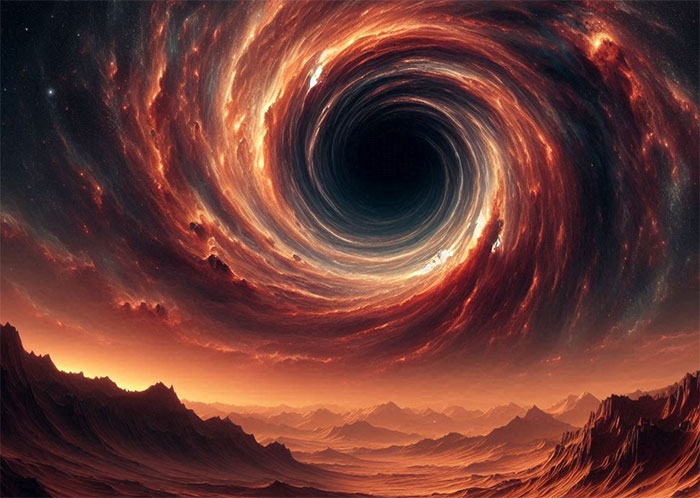13.8 billion year old 'ghost' pierces the Solar System
Objects born in the first second after the Big Bang could have just whizzed past and shaken planets in the Solar System.
According to Science Alert, a research team led by astrophysicist Tung Tran from the Massachusetts Institute of Technology (MIT - USA) has just shown that every 10 years, our Solar System welcomes an uninvited, invisible and scary guest, who is more than 13.8 billion years old.
These are primordial black holes (PBHs) , hypothetical objects that could have been born in the first second after the Big Bang event that created the universe.

Primordial black holes may have flown across the Solar System many times and made the planets, especially Mars, sway - (Illustration by AI: ANH THU).
Primordial black holes form from dense pockets of ionized matter that collapsed and dispersed throughout the universe over the past 13.8 billion years.
According to MIT researchers, they weigh as much as an asteroid despite being only the size of an atom.
However, these microscopic monsters are still enough to shake the planets in the Solar System with a glide of up to 200km/s and the power of a black hole.
According to a paper published in the scientific journal Physical Review D , the team simulated the effects that would occur if a primordial black hole flew past Mercury, Venus, and Mars.
It's powerful enough to shake all of these planets, but Mars will give the clearest signal, because it's also the planet that Earthlings can most easily track.
If a black hole of this type came within about 450 million kilometers of Mars, it would cause a detectable wobble in the planet's orbit.
This shift is only about 1 meter over 10 years, but enough for sensors to detect, because we can measure the distance from Mars to Earth with an accuracy of about 10 centimeters.
They also considered the possibility of a primordial black hole approaching the Earth-Moon system, with less pronounced effects.
"There are many other dynamics in the Solar System that could act as a kind of friction that causes the oscillation to slow down," the authors explain.
So, humanity can rest assured and focus its eyes on Mars to detect uninvited guests, which can contribute to helping us understand more about dark matter - a type of matter that is abundant throughout the universe but is also extremely mysterious.
- 4.6 billion year old cosmic dust covered the roof of Europe
- Explore the atmospheric atmospheres of the solar system
- People are about to leave the Solar System
- Discover the oldest solar system outside the solar system
- Beautiful photo from the Solar System
- Future vision of the solar system
- Found strange meteorites outside the Solar System: Suspect alien remnants
- The largest solar system in the universe
- Voyager 2 leaves the Solar System, enters the interstellar realm
- The American spacecraft exits the solar system
- Detecting the 'copy' of the solar system
- Build miniature solar system in the desert
 Van Allen's belt and evidence that the Apollo 11 mission to the Moon was myth
Van Allen's belt and evidence that the Apollo 11 mission to the Moon was myth The levels of civilization in the universe (Kardashev scale)
The levels of civilization in the universe (Kardashev scale) Today Mars, the sun and the Earth are aligned
Today Mars, the sun and the Earth are aligned The Amazon owner announced a secret plan to build a space base for thousands of people
The Amazon owner announced a secret plan to build a space base for thousands of people